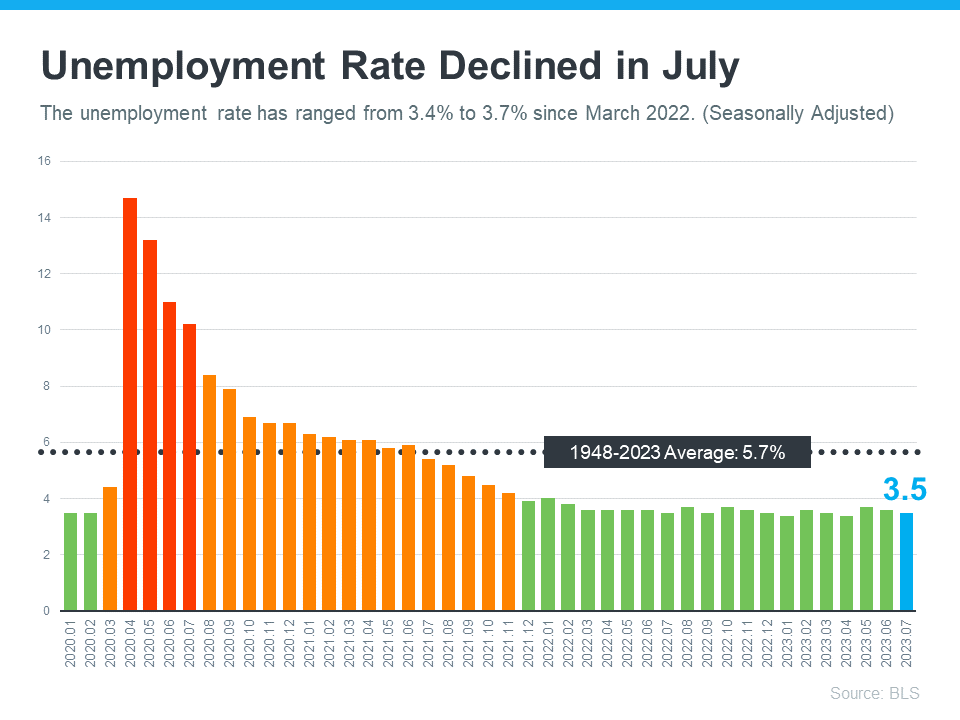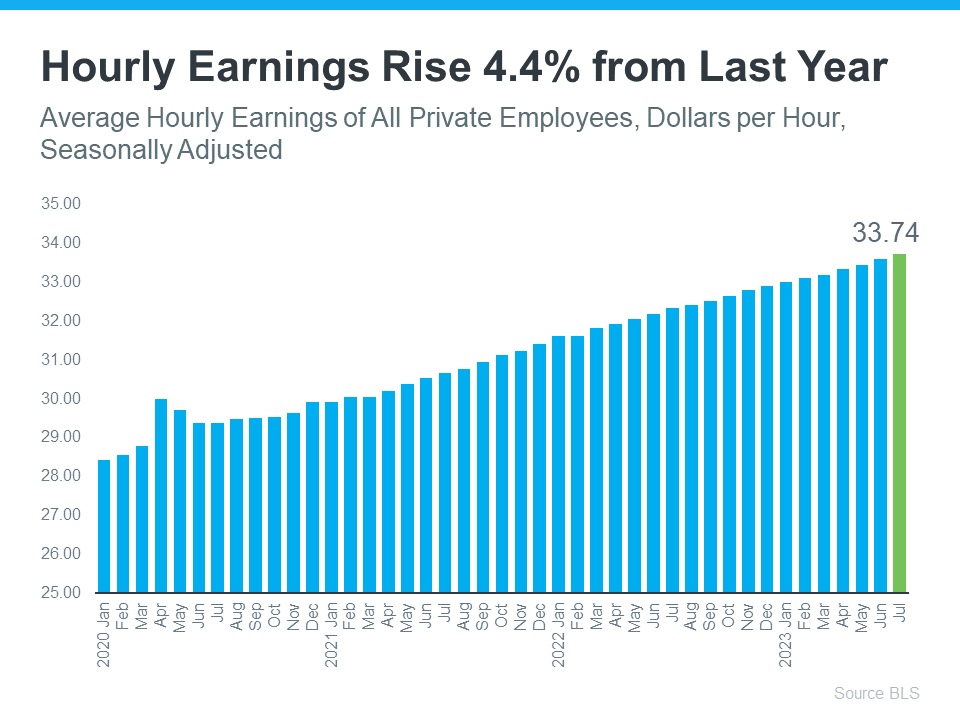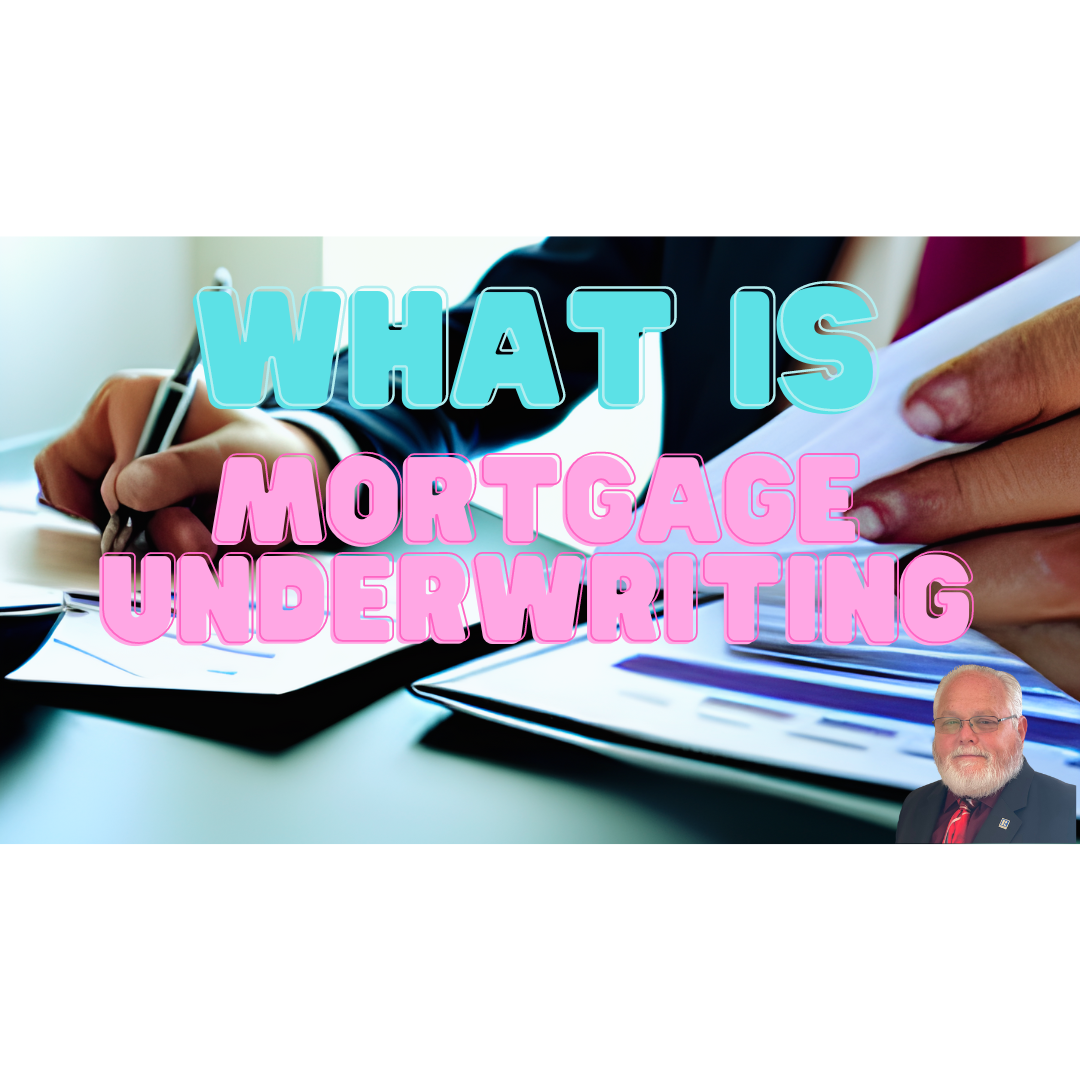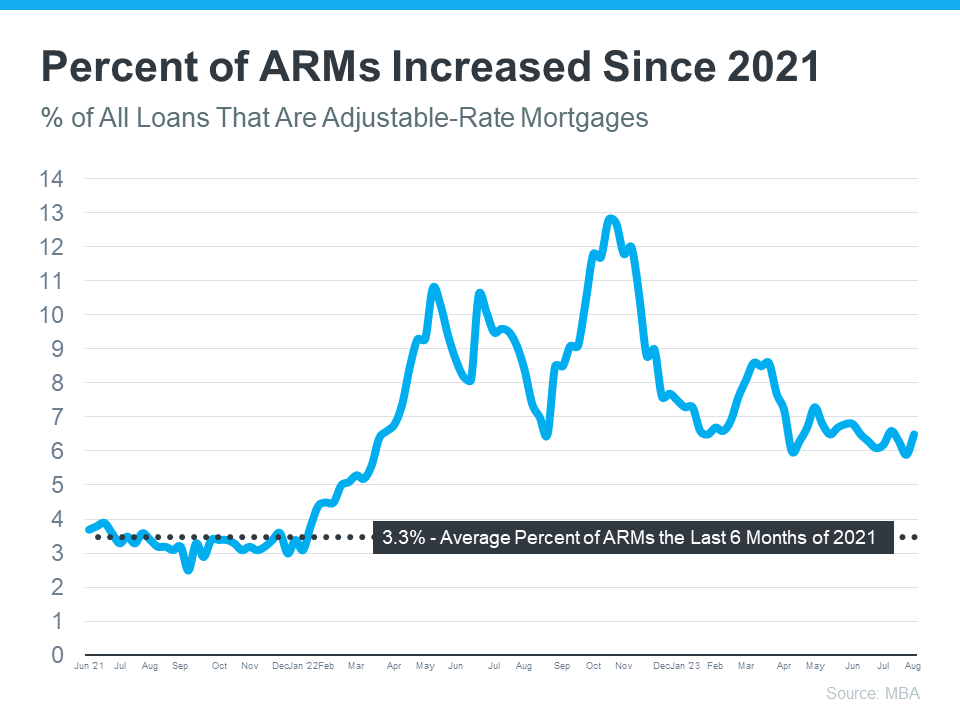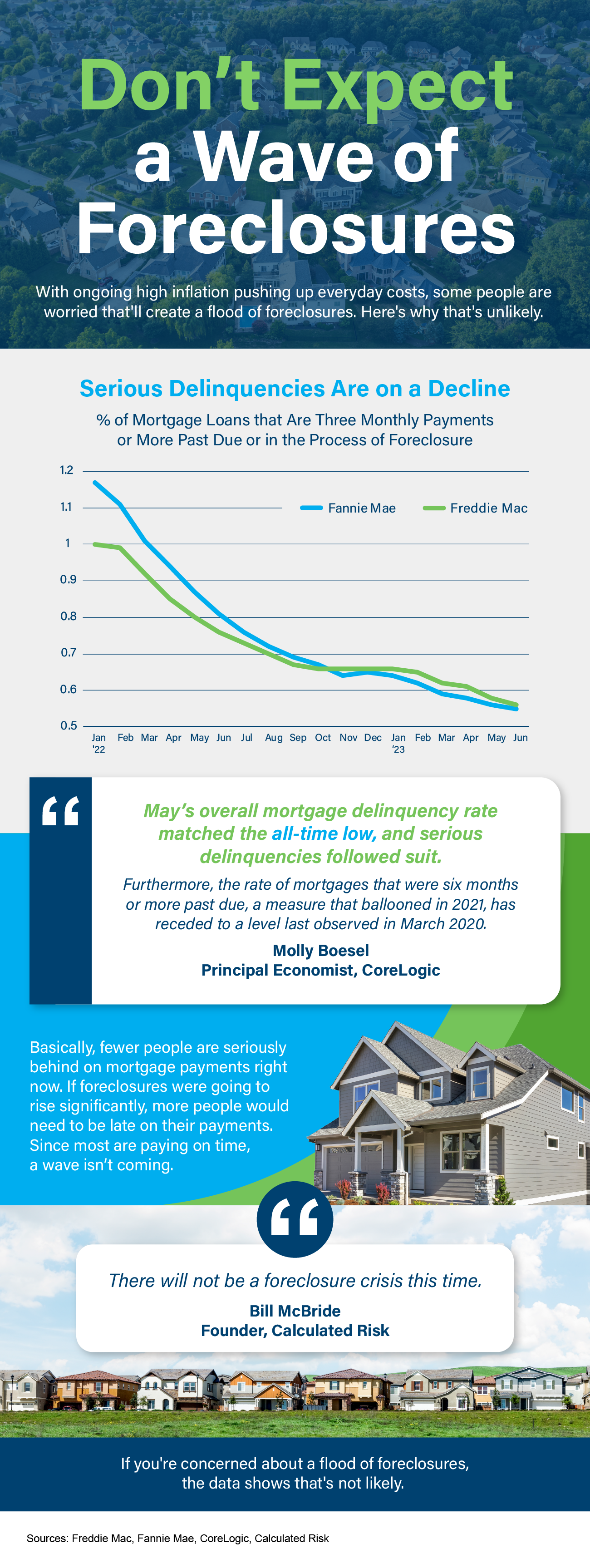Social Links Widget
Click here to edit the Social Media Links settings. This text will not be visible on the front end.
More Jobs and Better Pay Leads to More Buyer Demand


There’s been talk about a recession for quite a while now. But the economy has been remarkably resilient. Why? One reason is employment and wages have stayed strong. Let’s look at the latest information on each one and why both are good news if you’re thinking about selling your house.
More Jobs Are Being Created
Instead of facing the job losses typical of any recession, the economy has been growing and adding jobs. According to the Bureau of Labor Statistics (BLS), 187,000 jobs were created in July, which is up from the 185,000 created in June. That means more people are finding work. In fact, so many jobs are being added that the unemployment rate is far lower than the long-term average of 5.7% (see graph below):
A low unemployment rate means that most people who want to work are finding jobs. When people have jobs, they have steady incomes – and that can help set them up to consider homeownership.
People Are Making More Money
And data also shows hourly earnings have been going up pretty steadily over the past few years (see graph below):
When wages rise, people have more money that they could save or use toward buying a home. This increase in income helps offset some of the affordability challenges in the housing market today. Affordability depends on three main factors: wages, home prices, and mortgage rates. With higher home prices and mortgage rates right now, Builder Online summarizes how growing wages can help:
“The housing market has been a beneficiary of the strong economy and labor market. Many of those employed have saved money over the past few years and used those funds toward a down payment on a home.”
If you’re thinking about selling your house, a strong job market, growing wages, and the resulting buyer demand is fantastic news. It means there’s a larger pool of potential buyers out there who are in a position to pursue their dreams of homeownership.
Bottom Line
With more jobs and rising wages creating eager buyers, there’s a lot going in your favor. Let’s connect so you have someone who can guide you through the process of selling your house, from setting the right price to getting your home ready to show.
Why You Need a True Expert in Today’s Housing Market


The housing market continues to shift and change, and in a fast-moving landscape like we’re in right now, it’s more important than ever to have a trusted real estate agent on your side. Whether you’re buying your first home or selling once again, it’s mission critical to work with an expert who can guide you through each unique step of the process.
The reality is, not all agents operate the same way. To truly make a powerful and confident decision as you buy or sell a home, you need a real estate expert who uses their knowledge of what’s really happening with home prices, housing supply, industry projections, and more to give you the best possible advice. Someone who can provide clarity and trust like that is essential to your success. Jay Thompson, Real Estate Industry Consultant, explains:
“Housing market headlines are everywhere. Many are quite sensational, ending with exclamation points or predicting impending doom for the industry. Clickbait, the sensationalizing of headlines and content, has been an issue since the dawn of the internet, and housing news is not immune to it.”
Unfortunately, when information in the media isn’t clear, it can generate a lot of fear and uncertainty for consumers. As Jason Lewris, Co-Founder and Chief Data Officer at Parcl, says:
“In the absence of trustworthy, up-to-date information, real estate decisions are increasingly being driven by fear, uncertainty, and doubt.”
But it doesn’t have to be that way. Buying a home is a big decision, and it should be one you feel confident making. You can lean on an expert to help you separate fact from fiction and get the answers you need.
The right agent can assist you in figuring out what’s going on at the national level and in your local area. They can debunk headlines using data you can trust. Experts have in-depth knowledge of the industry and can provide context, so you know how current trends compare to the normal ebbs and flows in the housing market, historical data, and more.
Then, to make sure you have the full picture, an agent can tell you if your local area is following the national trend or if they’re seeing something different in your market. Together, you can use all that information to make the best possible decision.
After all, making a move is a potentially life-changing milestone. It should be something you feel ready for and excited about. And that’s where a trusted expert comes in.
Bottom Line
If you want sound advice and trusted information about our local housing market, let’s connect.
Why You Don’t Need To Fear the Return of Adjustable-Rate Mortgages


If you remember the housing crash back in 2008, you may recall just how popular adjustable-rate mortgages (ARMs) were back then. And after years of being virtually nonexistent, more people are once again using ARMs when buying a home. Let’s break down why that’s happening and why this isn’t cause for concern.
Why ARMs Have Gained Popularity More Recently
This graph uses data from the Mortgage Bankers Association (MBA) to show how the percentage of adjustable-rate mortgages has increased over the past few years:
As the graph conveys, after hovering around 3% of all mortgages in 2021, many more homeowners turned to adjustable-rate mortgages again last year. There’s a simple explanation for that increase. Last year is when mortgage rates climbed dramatically. With higher borrowing costs, some homeowners decided to take out this type of loan because traditional borrowing costs were high, and an ARM gave them a lower rate.
Why Today’s ARMs Aren’t Like the Ones in 2008
To put things into perspective, let’s remember these aren’t like the ARMs that became popular leading up to 2008. Part of what caused the housing crash was loose lending standards. Back then, when a buyer got an ARM, banks and lenders didn’t require proof of their employment, assets, income, etc. Basically, people were getting loans that they shouldn’t have been awarded. This set many homeowners up for trouble because they couldn’t pay back the loans that they never had to qualify for in the first place.
This time around, lending standards are different. Banks and lenders learned from the crash, and now they verify income, assets, employment, and more. This means today’s buyers actually have to qualify for their loans and show they’ll be able to repay them.
Archana Pradhan, Economist at CoreLogic, explains the difference between then and now:
“Around 60% of Adjustable-Rate Mortgages (ARM) that were originated in 2007 were low- or no-documentation loans . . . Similarly, in 2005, 29% of ARM borrowers had credit scores below 640 . . . Currently, almost all conventional loans, including both ARMs and Fixed-Rate Mortgages, require full documentation, are amortized, and are made to borrowers with credit scores above 640.”
In simple terms, Laurie Goodman at Urban Institute helps drive this point home by saying:
“Today’s Adjustable-Rate Mortgages are no riskier than other mortgage products and their lower monthly payments could increase access to homeownership for more potential buyers.”
Bottom Line
If you’re worried today’s adjustable-rate mortgages are like the ones from the housing crash, rest assured, things are different this time.
And, if you’re a first-time homebuyer and you’d like to learn more about lending options that could help you overcome today’s affordability challenges, reach out to a trusted lender.
How Much Does It Cost to Build a Garage


Wide garage double door and concrete driveway of new modern american house.
Unlocking the Financial Aspects of Garage Construction
A garage isn’t just a space for your car; it’s a versatile asset that enhances the value of your property. Whether you’re considering constructing a new garage or revamping the existing one, understanding the financial implications is crucial. Our comprehensive guide will walk you through estimating building expenses, potential cost savings, and the return on investment to assist you in making informed decisions.
Unveiling Garage Construction Costs
The financial layout of a garage project revolves around several key factors, each influencing the overall expenditure. To effectively gauge the budget, consider the following points:
Estimating by Square Foot
Professionals typically gauge garage construction costs at a rate of $35 to $70 per square foot. For instance, a 12-foot-by-24-foot single-car garage might average around $15,000, while a 24-foot-by-24-foot two-car garage could cost approximately $30,000. Keep in mind that these figures are flexible and subject to the unique attributes of your project.
Categorizing by Type
The cost analysis fluctuates based on whether your garage will be attached or detached from your home. While a larger detached garage might entail higher expenses, building a compact, single-car detached garage could be a cost-effective alternative. Carefully weigh the pros and cons of each option, and consult a contractor for tailored estimates aligned with your budget.
Incorporating Upgrades and Additional Costs
Should your garage double as a workspace, essentials like lighting, heating, and water facilities will impact the financial aspect. These amenities may elevate construction and maintenance costs. Moreover, adding supplementary living areas, such as a loft space, will contribute significantly to your expenses, particularly if utilities are involved.
Balancing the Budget: DIY vs. Contractor vs. Prefab
Opting for the right construction approach is pivotal in optimizing costs. Delve into these three options to identify the best fit for your circumstances:
- Do-It-Yourself (DIY): While building a garage on your own can save money, it’s not advisable for beginners. If you lack experience, hiring a contractor guarantees an efficient and cost-effective outcome, sparing you time, funds, and potential headaches.
- Contractor Assistance: If you possess construction know-how, you can take on the bulk of the project and enlist licensed professionals for specific tasks like HVAC, electrical work, or plumbing. This amalgamation of efforts trims expenses while upholding quality.
- Prefab Garage: Purchasing a preconstructed garage is a cost-efficient alternative, though customization options may be limited. However, this approach offers a quicker turnaround and is lighter on your wallet than an entirely self-built garage.
Upgrade or Rebuild: A Critical Choice
When deciding between upgrading your existing garage or starting anew, various factors come into play. Elements such as your home’s age, foundation condition, intended use, and size preferences will influence your decision-making process. If enhancing your current space is more cost-effective and practical, you might opt for an upgrade. Conversely, structural issues or space requirements might steer you toward constructing a fresh garage.
Quantifying the Added Home Value
The value a garage contributes to your property varies based on its type. A detached garage can potentially increase your home’s value by one-half to one-fourth of the square footage price. For attached garages, statistics show that houses with such amenities tend to sell for roughly $25,000 more nationwide compared to those without. However, remember that these estimates don’t account for potential enhancements or utilities.
Partnering with Trustworthy Contractors
Enlisting a contractor is a pivotal step in your garage construction journey. A comprehensive estimate should encompass material costs, garage type, and desired amenities. A reputable contractor will furnish you with an accurate projection, encompassing labor, time, equipment rentals, and materials. Should you require assistance in finding a dependable contractor, consider consulting a REALTOR®, a member of the National Association of REALTORS®, for local recommendations.
In the modern era, garages have evolved into multifunctional spaces. Yet, before embarking on a garage transformation or embarking on new construction, conducting thorough research is paramount. A solid grasp of costs, potential returns, and construction alternatives will undoubtedly steer you towards a satisfying outcome.
Why Median Home Sales Price Is Confusing Right Now
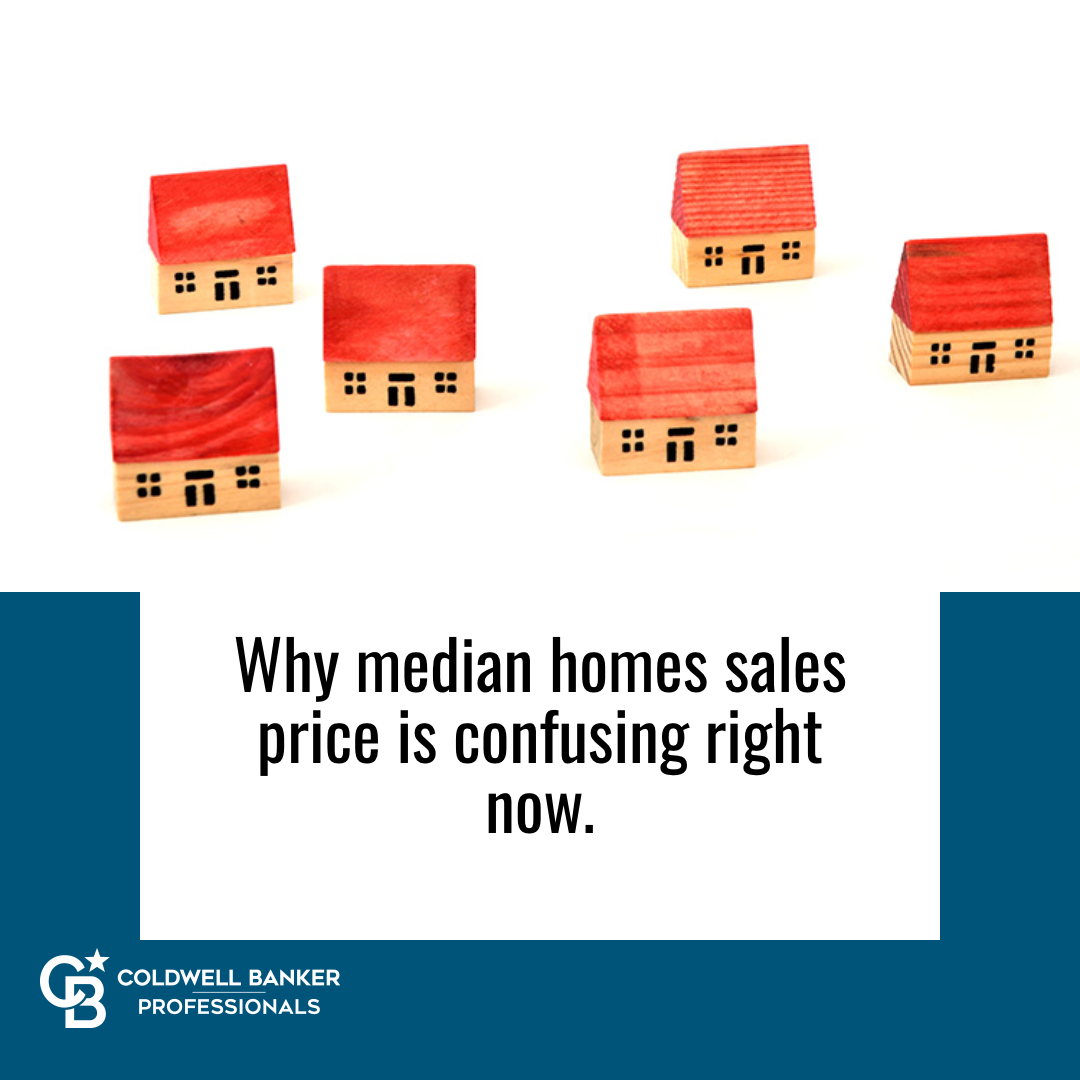

The National Association of Realtors (NAR) is set to release its most recent Existing Home Sales (EHS) report tomorrow. This monthly release provides information on the volume of sales and price trends for homes that have previously been owned. In the upcoming release, it’ll likely say home prices are down. This may seem a bit confusing, especially if you’ve been following along and reading the blogs saying home prices have hit the bottom and have since rebounded.
So, why would this say home prices are falling when so many other price reports say they’re going back up? It all depends on the methodology of each one. NAR reports on the median home sales price, while some other sources use repeat sales prices. Here’s how those approaches differ.
The Center for Real Estate Studies at Wichita State University explains median sales prices like this:
“The median sale price measures the ‘middle’ price of homes that sold, meaning that half of the homes sold for a higher price and half sold for less . . . For example, if more lower-priced homes have sold recently, the median sale price would decline (because the “middle” home is now a lower-priced home), even if the value of each individual home is rising.”
Investopedia helps define what a repeat sales approach means:
“Repeat-sales methods calculate changes in home prices based on sales of the same property, thereby avoiding the problem of trying to account for price differences in homes with varying characteristics.”
The Challenge with the Median Home Sales Price Today
As the quotes above say, the approaches can tell different stories. That’s why median home sales price data (like EHS) may say prices are down, even though the vast majority of the repeat sales reports show prices are appreciating again.
Bill McBride, Author of the Calculated Risk blog, sums the difference up like this:
“Median prices are distorted by the mix and repeat sales indexes like Case-Shiller and FHFA are probably better for measuring prices.”
To drive this point home, here’s a simple explanation of median value (see visual below). Let’s say you have three coins in your pocket, and you decide to line them up according to their value from low to high. If you have one nickel and two dimes, the median value (the middle one) is 10 cents. If you have two nickels and one dime, the median value is now five cents.
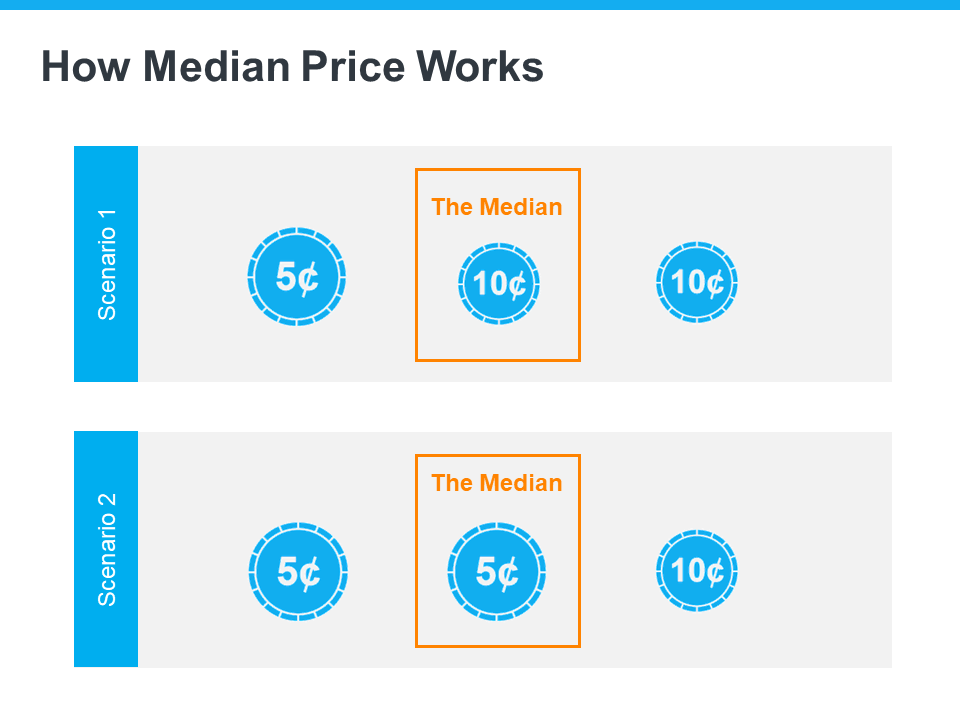 In both cases, a nickel is still worth five cents and a dime is still worth 10 cents. The value of each coin didn’t change.
In both cases, a nickel is still worth five cents and a dime is still worth 10 cents. The value of each coin didn’t change.
That’s why using the median home sales price as a gauge of what’s happening with home values may be confusing right now. Most buyers look at home prices as a starting point to determine if they match their budgets. But most people buy homes based on the monthly mortgage payment they can afford, not just the price of the house. When mortgage rates are higher, you may have to buy a less expensive home to keep your monthly housing expense affordable.
That’s why a greater number of ‘less-expensive’ houses are selling right now – and that’s causing the median home sales price to decline. But that doesn’t mean any single house lost value.
When you see the stories in the media that prices are falling later this week, remember the coins. Just because the median home sales price changes, it doesn’t mean home prices are falling. What it means is the mix of homes being sold is being impacted by affordability and current mortgage rates.
Bottom Line
For a more in-depth understanding of home price trends and reports, let’s connect.
An Easy Way to Understand Home Price Deceleration (Video)

Home prices are still growing – just not as fast. What we’re seeing is the deceleration of appreciation, not depreciation. Let’s connect if you have questions about home prices.
Don’t Expect a Wave of Foreclosures

Some Highlights
- With ongoing high inflation pushing up everyday costs, some people are worried that’ll create a flood of foreclosures. Here’s why that’s unlikely.
- Fewer people are seriously behind on mortgage payments right now. If foreclosures were going to rise a lot, more people would need to be late on their payments.
- Since most are paying on time, a wave isn’t coming. If you’re concerned about a flood of foreclosures, the data shows that’s not likely.
People Want Less Expensive Homes – And Builders Are Responding
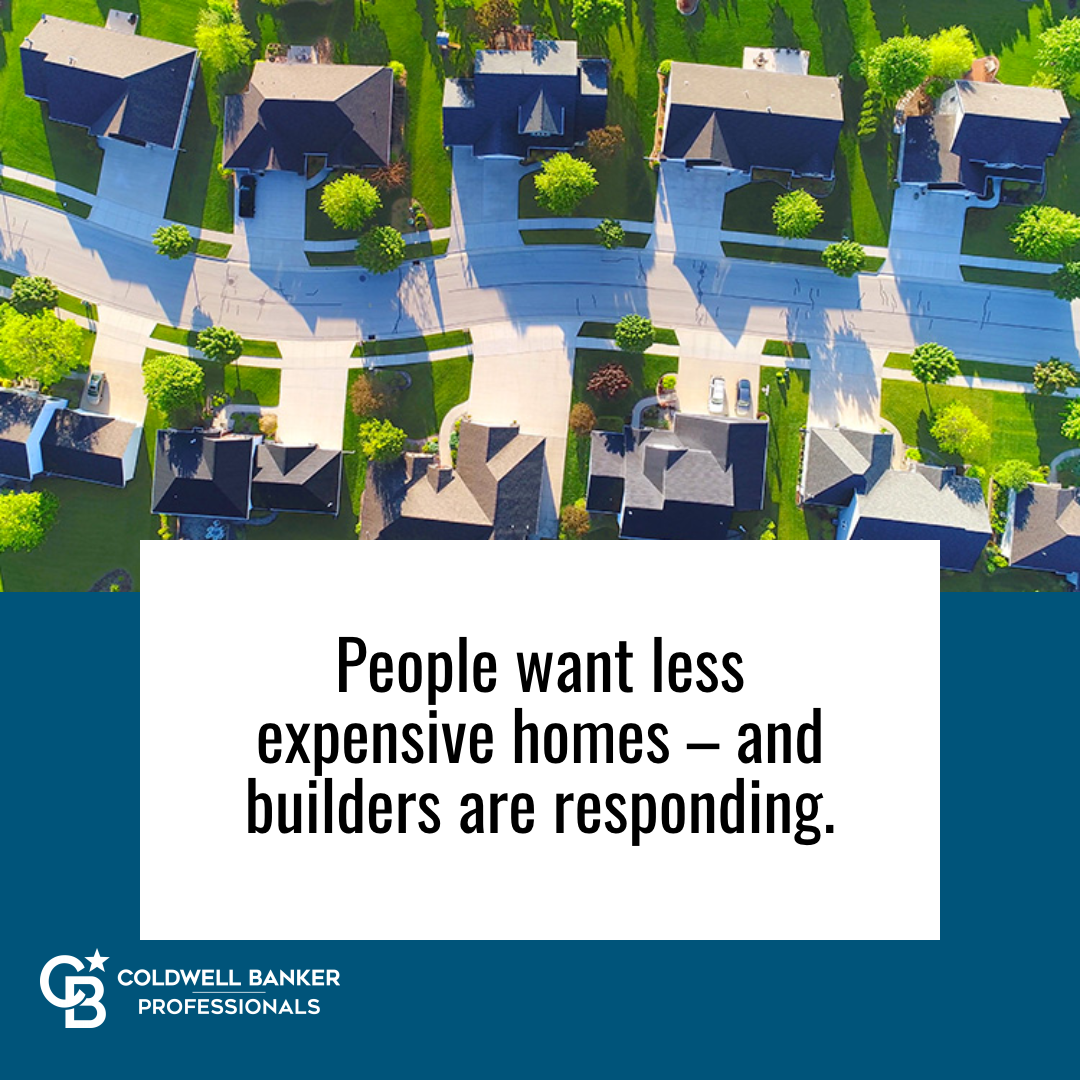

In today’s housing market, there are two main affordability challenges impacting buyers: mortgage rates that are higher than they’ve been the past couple of years, and rising home prices caused by low inventory. To overcome those challenges, many people are working with their agents to find less expensive homes. And with newly built homes making up a historically large percentage of the total available inventory today, that search often includes brand new homes.
People Are Spending Less on Newly Built Homes
The graph below uses the latest information from the Census to show, in June, more of the newly built home sales in this country were in lower price ranges than in 2022: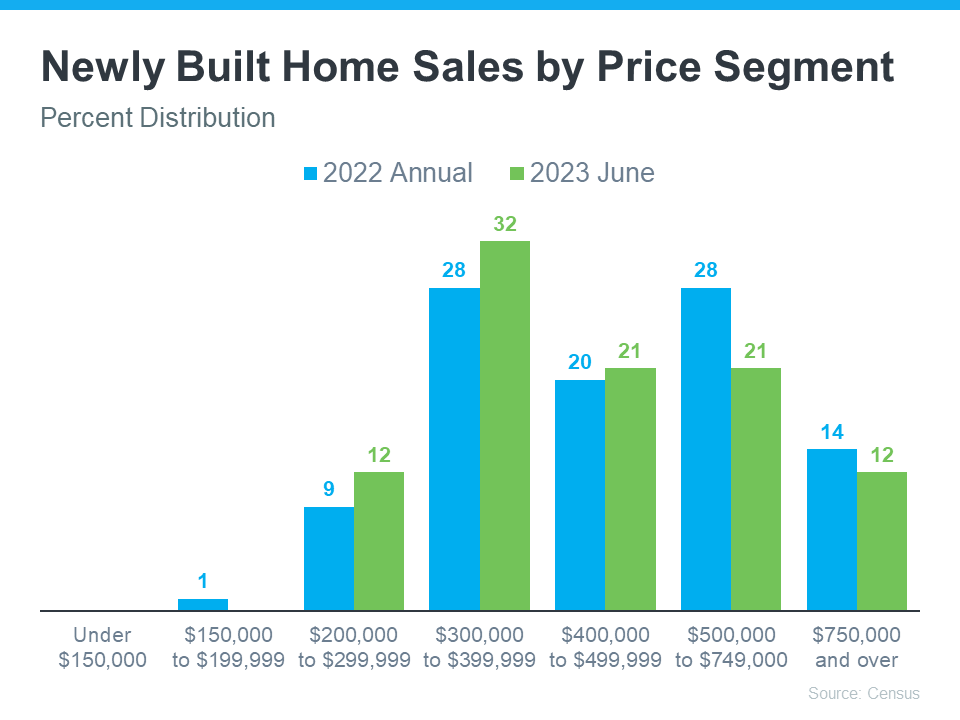 Last year, only 58% of newly built home sales were less than $500,000. This June, that number was up to 65%. This means more people are buying less expensive newly built homes right now while affordability remains a challenge.
Last year, only 58% of newly built home sales were less than $500,000. This June, that number was up to 65%. This means more people are buying less expensive newly built homes right now while affordability remains a challenge.
Builders Are Offering Lower-Cost Options
Builders have picked up on this trend and are reacting accordingly. George Ratiu, Chief Economist at Keeping Current Matters, explains:
“Builders are also responding to this shift by bringing slightly smaller homes to market in an effort to meet lower price points . . .”
New data from the Census further confirms this pattern – it shows the median sales price of newly built homes has dipped down in recent months (see graph below):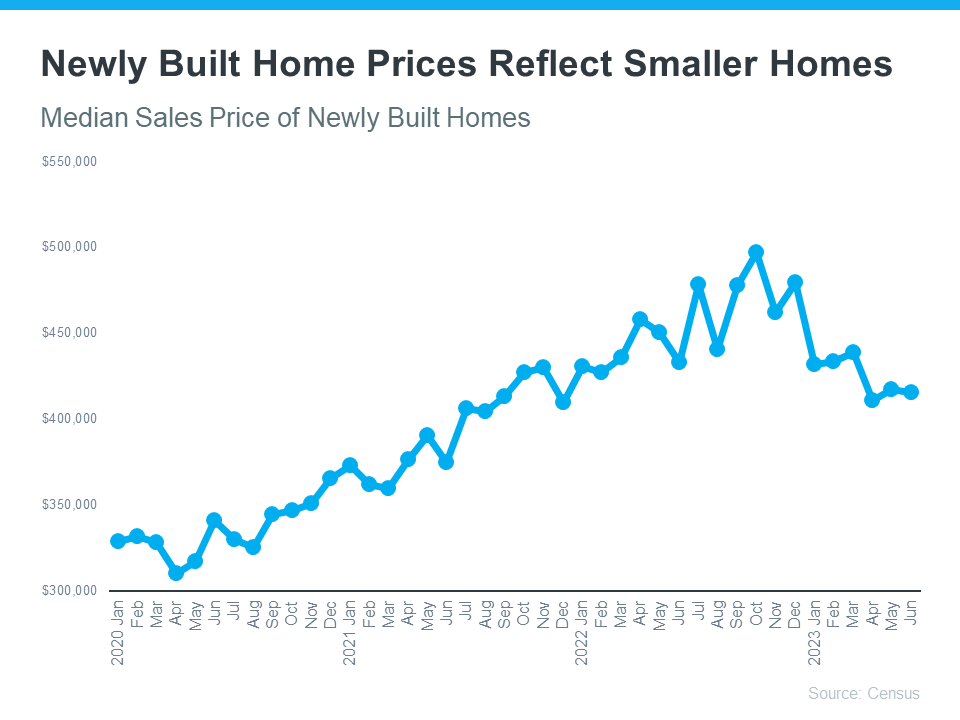 And as Mikaela Arroyo, Director of the New Home Trends Institute at John Burns Real Estate Consulting, says, the builders who are most responsive to this trend are forming pathways to homeownership:
And as Mikaela Arroyo, Director of the New Home Trends Institute at John Burns Real Estate Consulting, says, the builders who are most responsive to this trend are forming pathways to homeownership:
“. . . it is creating opportunities for people to be able to afford an entry-level home in an area. . . . if you get that size down, that automatically will make it a more affordable home. The [builders] that are decreasing [size] the most are probably the ones that try to build more of an affordable product.”
How an Agent Can Help
Builders producing smaller, less expensive newly built homes give you more affordable options at a time when that’s really needed. If you’re hoping to buy a home soon, partner with a local real estate agent to find out what’s available in your area. An agent can help you look at newly built homes or ones under construction nearby.
Bottom Line
If you’re having a hard time finding a home you like in your budget, let’s connect. You need a real estate professional who knows all about the latest inventory in our area, including homes still under construction or just built. That way you have an expert on your side who can provide information on builder reputations, builder contracts and negotiations, and more to help you with the homebuying process.

 Facebook
Facebook
 X
X
 Pinterest
Pinterest
 Copy Link
Copy Link
